Where Ancient Pearls Meet Digital Gold: Qatar's Trade and Treasury Evolution Unfolds
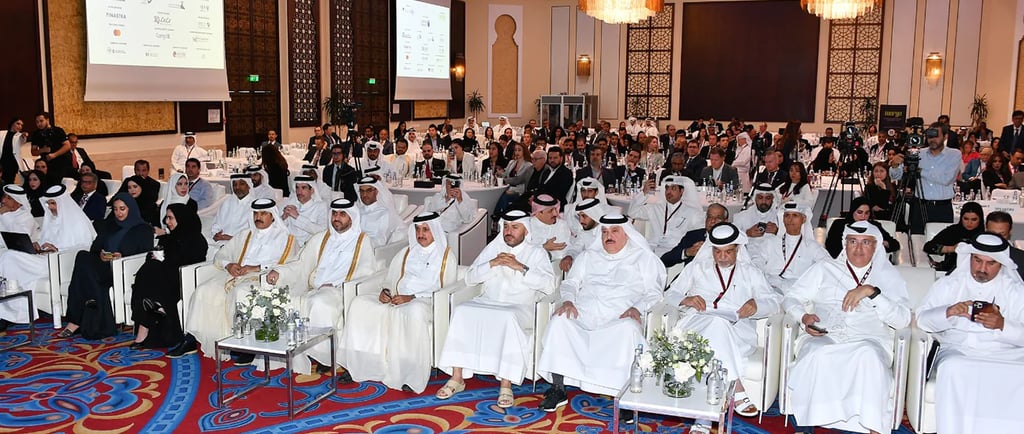

A thousand-year-old trade route that once carried precious jewels and glassware from the Gulf to Java and beyond is now home to something far more valuable: digital innovation that's reshaping the global financial sector.
As international business leaders gathered at the Qatar Trade & Treasury Transformation Summit in May 2025, they were treated to tales of pearls, beads, and glassware discovered in Indonesian shipwrecks – artefacts that remarkably resembled treasures from Qatar's own archaeological sites.
Just as those ancient traders pioneered cross-border commerce, Qatar is now exploring new territories in digital finance, backed by a planned $2.4 billion investment in AI capabilities and impressive trade growth of 27.89% (compared to world growth of 5.34%).
The inaugural summit, co-organised by the International Chamber of Commerce Qatar, Qatar Chamber, and MERGE Events, under the patronage of HE Sheikh Faisal bin Thani bin Faisal Al Thani, Minister of Commerce and Industry was a declaration of intent from a nation transforming itself into a digital powerhouse within the GCC region.
Qatar's growing firepower
With over 350 delegates in attendance, and an impressive international press corps, the summit began with welcoming speeches from HE Sheikh Khalifa bin Jassim Al Thani, Chairman of Qatar Chamber of Commerce, and HE Sheikh Faisal bin Thani bin Faisal Al Thani, Minister of Commerce and Industry. Both leaders emphasised the country’s commitment to becoming a regional hub for financial innovation, setting the tone for a day of transformative discussions.
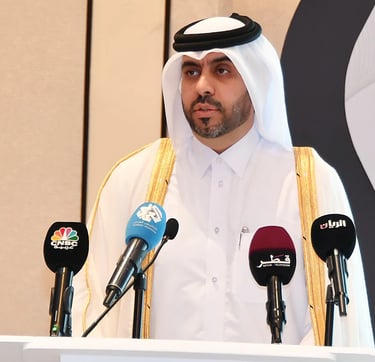

Putting up digital defences
At a time when financial criminals can move billions across borders in split seconds, and with just a few keystrokes, the session on ‘Tackling Money Laundering, Sanctions, and Fraud’ felt like a high-stakes discussion. Moderated by Kseniia Neboga from EY, this panel brought together HE Sheikh Thani Al Thani from Qatar International Centre for Conciliation and Arbitration, Claudia Al Hage from Rashed R. al Marri Law Office, and Dhritimaan Shukla, also from EY.
Breaking the paper chains
Perhaps the most technically-rich session was ‘The Future of Trade Finance: Reaping the Rewards of Digital Transformation,’ moderated by Carlos Teixeira from Finastra. The all-star panel included Alaa Al Rousan from SWIFT, Venkata Surya Prasad Indraganti from Commercial Bank Qatar, Clyde Rosanowski from Mastercard, and Bojan Čekrlić from CargoX.
Not shying away from the elephant in the room, the discussion addressed a critical challenge: trade finance remains heavily reliant on manual, paper-based processes and it is holding back progress. The frustration was evident, since digital solutions exist, and are growing, but the legal framework and widespread adoption have taken time to catch up.
Thankfully, explained the panellists, the UK's Electronic Trade Documents Act (ETDA) and the growth of Model Law on Electronic Transferable Records (MLETR) are preparing global markets for digital documentation. The International Chamber of Commerce's Digital Standards Initiative (DSI) was also cited as crucial for establishing globally harmonised digital trade environments. And cross-border payments are evolving in tandem, with stablecoins coming into the frame as a future gamechanger.
The overall reality check from the experts was sobering, however. Despite years of discussing digitisation, the industry still lacks true end-to-end digital trade finance flows. But the immediate wins – including freed working capital, reduced trade finance gaps, and enhanced compliance – make the digital transition compelling and we will continue to ‘fight the good fight’ together as an industry. After all, Rome was not built in a day.
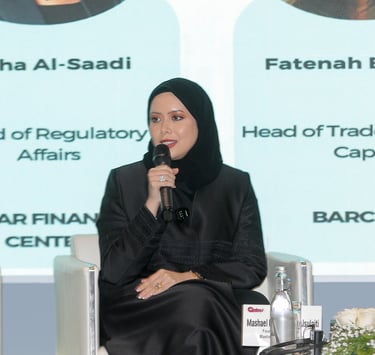

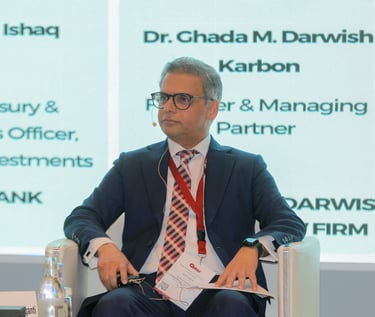

Modern day treasury
Robust treasury management no longer requires endless spreadsheets and completely manual forecasting. The ‘Treasury Transformation – Moving from Theory to Reality’ session showcased how Qatar's financial sector is embracing cutting-edge technology to help automation and innovation. Moderated by George Tataru from Finastra, this expert panel assembled treasury leaders Tahir Pirzada from Al Rayan Bank, Derek Kwok from Ahli Bank, Dr. Fawad Ishaq from Doha Bank, legal expert Dr. Ghada M. Darwish Karbon, and academic researcher Dr. Alanoud Al-Maadid from Qatar University.
Turning financial fiction into reality, the session explored how AI-powered tools are already enhancing liquidity forecasting, how blockchain networks are creating Fort Knox-level security for settlements, and how cloud-based systems are offering unrivalled scalability for treasury management systems and more.
But this wasn't a session focused on “shiny new toys”. The panel went deep into the trenches of real-world implementation, wrestling with the realities of integrating digital channels and adopting a microservices architecture that can make or break financial flows. Qatar's academic institutions emerged as the unsung heroes, contributing cutting-edge research on automation and risk mitigation that's bridging the gap between what's theoretically possible and what actually works in practice.
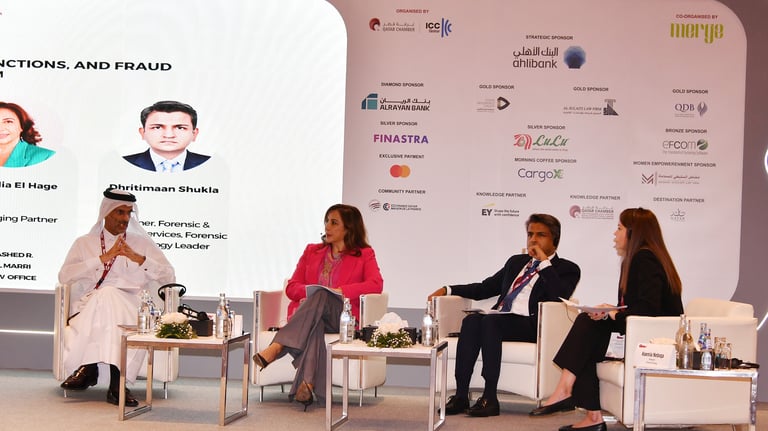


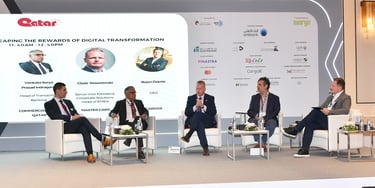
Overcoming diversity barriers
Qatar's remarkable journey in women's workforce participation provided compelling context for the ‘Women’s Empowerment – Trade & Treasury MENA’ session, moderated by Eleanor Hill, Content Director, MERGE Events. In 2024, female labour force participation in Qatar reached 63.31% significantly above the global average of 51.07% making it the highest in the Middle East region. The panel featuring Dr. Bothaina Al-Ansari from Just Real Estate Qatar, Mashael Mohammad Al Sulaiti from Mashael Al Sulaiti Law Firm, Maha Al-Saadi from Qatar Financial Centre, and Fatenah El Danab from Barclays Bank, spoke from a position of proven progress.
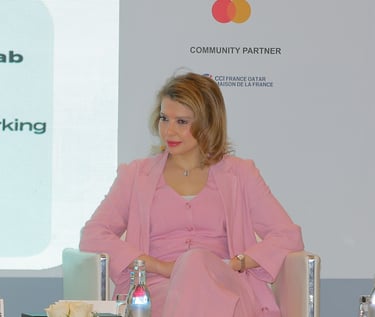

Islamic finance innovation
Bringing a fresh take on an established tool, Abdelrahman Elbeltagy, an Islamic Factoring Expert from efcom, presented an eye-opening session on ‘Optimising Islamic Factoring Operations: Modern Workflow Solutions.’ This presentation highlighted how Islamic finance principles integrate with modern fintech solutions, addressing the unique requirements of Sharia-compliant financial products.
The showcase – which prompted great interest from the audience – also demonstrated how digital platforms can enhance Islamic factoring operations while maintaining compliance, demonstrating true fintech innovation.
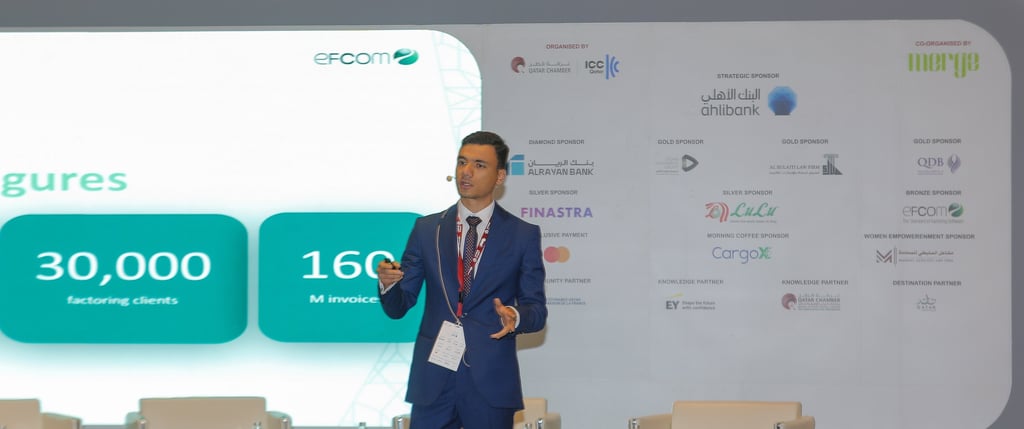

A cross-border payments revolution
The final technical session, ‘Cross-border Payments: From Instant and Blockchain Payments to Embedded FX,’ moderated by Alaa Al Rousan from SWIFT, featured Dr. Jalal Qanas from Qatar University, and Mohammed Al-Delaimi from SkipCash.
Kicking off the debate, the experts revealed the staggering scale of transformation ahead: cross-border payment flows (estimated at $150 trillion in recent years) could hit $250 trillion by 2027, with digital transformation accelerating rapidly since COVID-19. The fact that Qatar is rapidly developing a regulated digital asset ecosystem, under a framework introduced by the Qatar Financial Centre in 2024, also provided compelling context for the discussion of how blockchain and Central Bank Digital Currencies (CBDCs) are reshaping the financial landscape.
Elsewhere, the conversation highlighted how initiatives by entrepreneurs, like Al-Delaimi's SkipCash, are challenging traditional banking models by prioritising customer convenience, transparency, and speed in cross-border transactions. Nevertheless, the speakers emphasised that while technology serves as a critical enabler, it's not a complete solution – the human elements of trust, regulation, and collaboration remain paramount.
Indeed, the evolving role of regulators was a key discussion point, with governments increasingly recognising the need to create supportive environments for financial innovation while maintaining consumer protection. The debate spotlighted regulatory sandboxes as vital testing grounds for innovative solutions, enabling controlled experimentation that benefits both innovators and consumers.
Audience members also heard how geopolitical tensions are driving demand for alternative payment systems, while digital technologies create opportunities for more inclusive financial ecosystems. Meanwhile, competition was viewed as a positive force driving creativity and pushing the boundaries of financial services. The collaboration between public and private sectors, rather than rivalry, was positioned as essential for creating the infrastructure needed to support Qatar's digital finance ambitions and its role in the broader MENA financial transformation.
The digital Silk Road
As the summit concluded, the message of transformation was clear: Qatar is constructing a digital silk road that connects traditional financial systems with cutting-edge technology. The ancient routes that once made Qatar a trading hub for precious jewels and glassware are being replaced by data highways and crypto networks.
The convergence of AI, blockchain, and traditional finance discussed throughout the summit points to a future where digital solutions are integral to the GCC’s financial ecosystem. Qatar's approach – combining substantial investment, regulatory sophistication, and cultural sensitivity – offers a model for how resource-rich nations can successfully transition to knowledge-based economies.
From the opening discussion of ancient trade routes to the closing conversations about embedded FX and Islamic fintech, the Qatar Trade & Treasury Transformation Summit 2025 demonstrated that innovation doesn't require abandoning tradition – it requires transforming it for the digital age. As Qatar continues its journey towards Vision 2030, events like this summit serve as catalysts for the collaborations and innovations necessary to achieve these ambitious goals.
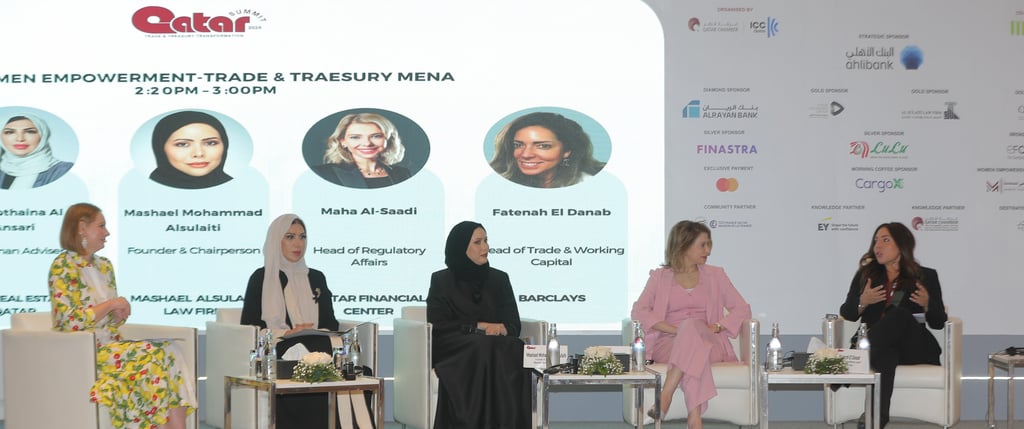

The first panel, ‘Qatar’s Growing Firepower as a Trading Nation,’ moderated by Sami Zeidan from Al Jazeera, revealed the remarkable scope of Qatar's economic transformation. The expert speakers, namely Mohammad Al Obaidly from Qatar Chamber of Commerce, Fahad Badar from Commercial Bank Qatar, Mubarak Al Sulati from Sulati Law Firm, and Ashraf Abuissa from Abuissa Holdings, painted a picture of a nation where total exports reached $130.9 billion with imports of $33.5 billion, creating a positive trade balance of $97.5 billion.
During the lively discussion, the panellists touched on how integrating digital transformation, entrepreneurship, and financial systems creates foundations for bold investments and global partnerships, with regional cooperation enhancing Qatar's trade competitiveness. The debate also revealed how traditional banking is evolving to support Qatar's diversification beyond energy sectors, particularly through fintech initiatives aligned with Qatar's Fintech Strategy launched by the Qatar Central Bank in 2023.
In addition, the experts explored how Qatar's regulatory environment facilitates international business and how private sector partnerships with international brands enhance the nation's global economic influence. Importantly, the conversation also highlighted the legal frameworks supporting this transformation and the role of various stakeholders in Qatar's economic diversification journey.
Much to the interest of the audience, the discussion revealed how AI-powered tools are being used in the fight against financial crime, turning algorithms into digital detectives that can spot suspicious patterns faster than any human analyst.
The panel also explored how advanced analytics and automation tools are becoming the new guardians of global finance, creating an intelligent shield around Qatar's financial ecosystem that learns and adapts to emerging threats in real-time – critical foundations for the country’s ambition to be a trusted global financial hub in an increasingly dangerous digital landscape.
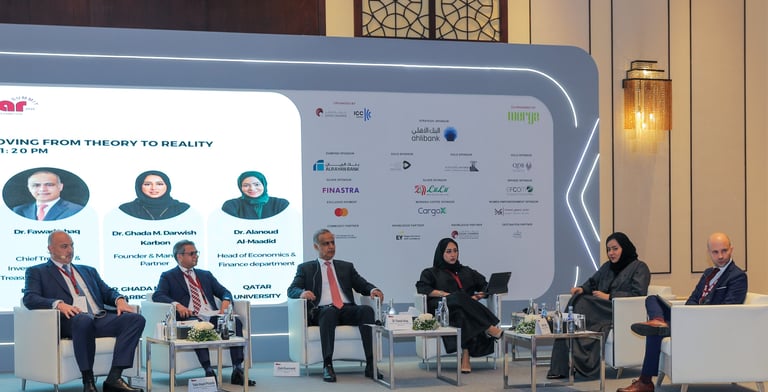

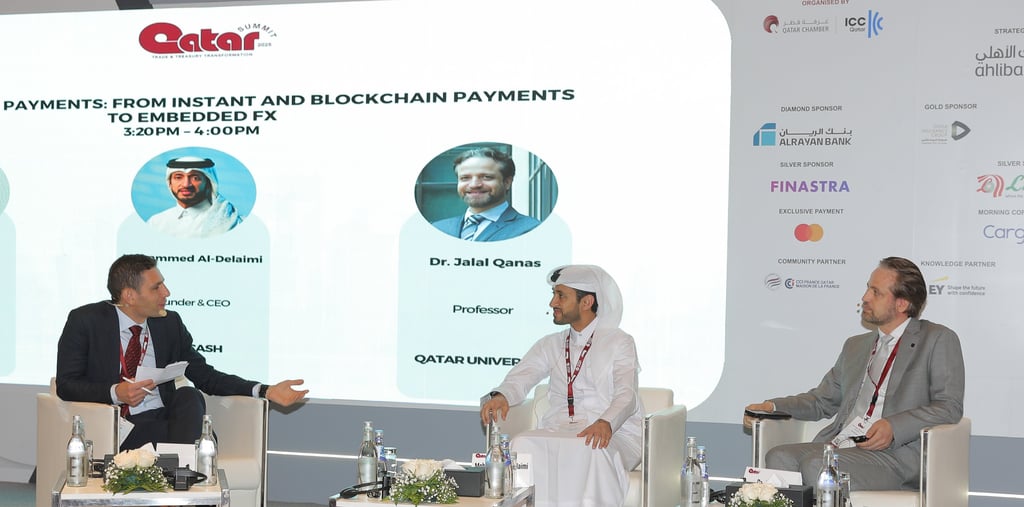

This 40-minute session packed powerful insights into gender equity advancement in finance, exploring the critical transition from compliance-driven quotas to values-driven cultural change. The experts emphasised how meaningful mentorship and organisational initiatives can accelerate inclusion.
A recurring theme emerged around the vital importance of sponsorship from senior men who can open doors and advocate for women's advancement at executive levels. However, the panellists were equally emphatic about women's responsibility to lift each other up – embracing the mindset of being "queen makers, not just queen bees." The discussion highlighted how women in leadership positions must actively create pathways for the next generation rather than viewing other women as competition.
